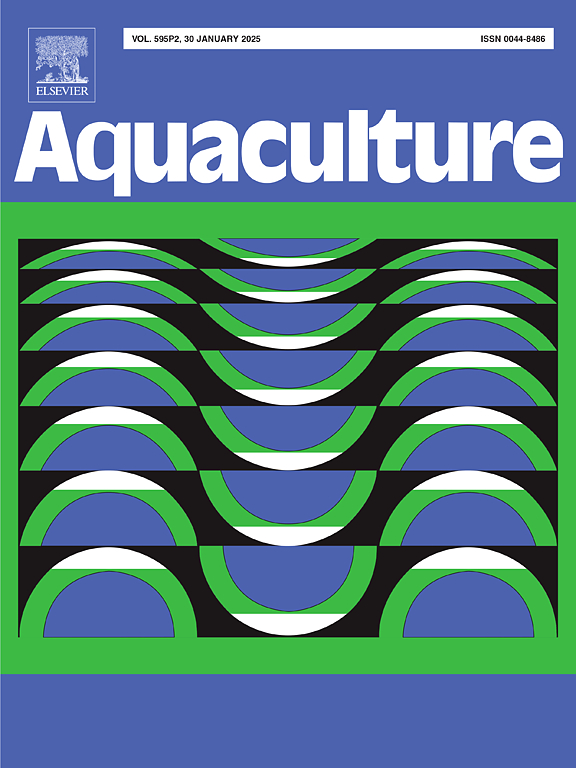整体组学分析显示糖海带如何促进大西洋鲑鱼的肠道健康
IF 3.9
1区 农林科学
Q1 FISHERIES
引用次数: 0
摘要
水产养殖业的预计增长要求不断优化饲养制度,特别是通过免疫刺激饲料补充剂提高抗病能力。由于海藻具有免疫刺激作用,同时还能减少碳排放和海洋富营养化,因此被认为是一种很有前景的补充剂。为了评估海藻补充剂的效果,我们分别进行了两项生长试验,一项是生长重量约为 300-600 克的封闭式陆基 RAS 系统,另一项是生长重量约为 500-2500 克的开放式水网试验。采用多组学方法研究了使用最高 2% 的发酵糖海带(Saccharina latissima)作为补充剂对大西洋鲑鱼(Salmo salar L.)生长性能和肠道健康的影响。标准生长指标和质量指标与宿主肠道转录组、肠道代谢组和肠道微生物组的多组学数据相结合。评估了加入海藻后鱼片中碘和重金属的含量。海藻添加量最高为 2%,对鲑鱼的生长性能或其他健康参数没有负面影响。虽然碘的浓度随着海藻添加量的增加而增加,但所有含量仍低于建议的阈值。此外,对 179 个个体进行的肠道转录组分析表明,海藻具有多种免疫刺激作用,包括与粘液产生和肠道稳态有关的粘蛋白生物合成和嘧啶代谢途径的过度表达。基因组分辨元基因组学显示,核心微生物组以支原体、光杆菌和芽孢杆菌为主。有趣的是,与目前存在的其他物种相比,这三种核心物种的组装基因组具有持续较高的基因组侵蚀和基因丢失水平,这表明宿主的适应性。此外,已知病原体(如阿利维弧菌)的流行率降低,突出了海藻通过阻碍机会性病原体的生长而产生的潜在保护作用。结果表明,补充高达 2% 的发酵海藻可以提高饲料效率,稳定肠道微生物群,并有可能增强对已知病原菌(包括阿里弧菌)的抵抗力。本文章由计算机程序翻译,如有差异,请以英文原文为准。
A holo-omics analysis shows how sugar kelp can boost gut health in Atlantic salmon
The projected growth of Aquaculture requires continuous optimisation of feeding regimes, especially in enhancing disease resilience through immunostimulating feed supplements. Seaweed has been introduced as a promising supplement due to its proposed immunostimulant effects, while mitigating carbon emissions and marine eutrophication. Two separate growth trials were performed to evaluate the effects of a seaweed supplement, focusing on a closed land-based RAS system with fish growing from ~300–600 g and an open water net-based trial with fish growing from ~500–2500 g. A multi-omics approach was taken to investigate the effect of using up to 2 % fermented sugar kelp (Saccharina latissima) as a supplement on the growth performance and gut health of Atlantic salmon (Salmo salar L.). Standard growth metrics and quality indicators were coupled with multi-omics data for the host intestinal transcriptome, intestinal metabolome, and intestinal microbiome. Levels of iodine and heavy metals in the fish fillets resulting from seaweed inclusion were evaluated. Seaweed additives up to 2 % had no negative impact on the salmon growth performance or other health parameters. While concentration of iodine increased with seaweed addition, all levels remain below recommended thresholds. Furthermore, gut transcriptome analyses of 179 individuals revealed multiple indications for an immunostimulant effect of seaweed, including overexpression of the mucin biosynthesis and pyrimidine metabolism pathways related to mucus production and intestinal homeostasis. Genome-resolved metagenomics revealed a core microbiome dominated by Mycoplasma, Photobacterium, and Brevinema species. Interestingly, the assembled genomes of these three core species had consistently higher levels of genome erosion and gene loss compared to other present species suggesting host adaptation. Further, reduced prevalence of known pathogens such as Aliivibrio highlights a potential protective effect of seaweed by impeding growth of opportunistic pathogens. Results suggest that supplementation of up to 2 % fermented seaweed can increase feed efficiency, stabilise the intestinal microbiome and potentially increase resistance against known pathogenic bacteria including Aliivibrio species.
求助全文
通过发布文献求助,成功后即可免费获取论文全文。
去求助
来源期刊

Aquaculture
农林科学-海洋与淡水生物学
CiteScore
8.60
自引率
17.80%
发文量
1246
审稿时长
56 days
期刊介绍:
Aquaculture is an international journal for the exploration, improvement and management of all freshwater and marine food resources. It publishes novel and innovative research of world-wide interest on farming of aquatic organisms, which includes finfish, mollusks, crustaceans and aquatic plants for human consumption. Research on ornamentals is not a focus of the Journal. Aquaculture only publishes papers with a clear relevance to improving aquaculture practices or a potential application.
 求助内容:
求助内容: 应助结果提醒方式:
应助结果提醒方式:


